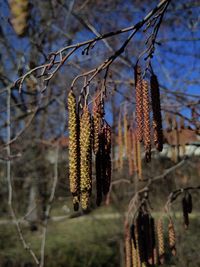Polleninformation für Vorarlberg vom 23. Februar 2026
In Vorarlberg blühen die Haseln und die Erlen!
Der Wochenbeginn ist in den Niederungen Vorarlbergs zwar verregnet, die Tagestemperaturen klettern jedoch über 10 °C. Ab Mittwoch wird es bis Ende der Woche sonnig und die Temperaturen steigen auf über 15 °C. An diesen Tagen werden ideale Bedingungen für die Pollenfreisetzung und den Pollenflug herrschen. Personen, die auf Frühblüher wie Hasel und Erle sensibilisiert sind, müssen sich auf eine verstärkte Belastung einstellen.
Die weit verbreiteten Strauchhaseln blühen bereits seit einigen Wochen in den niederen Höhenlagen Vorarlbergs. Sie besitzen weiterhin das Potenzial, Pollen freizusetzen. Auch die Baumhasel, eine nicht heimische Haselart, die gerne in Parks und Gärten angepflanzt wird, blüht derzeit und sorgt in ihrem Umfeld für zusätzliche lokale Belastungen.
In den Niederungen Vorarlbergs wird die Blüte der Grau- und Schwarz-Erlen in der kommenden Woche Fahrt aufnehmen. Aktuell überwiegen noch die blühenden Grau-Erlen. In den nächsten Tagen wird die Zahl der blühbereiten Schwarz-Erlen jedoch rasant zunehmen, sodass sie für den Großteil des Pollenflugs verantwortlich sein werden. Die Purpur-Erle ist bereits abgeblüht und wirft ihre leeren Kätzchen ab.
| Blühbereitschaft Erle | am |
|---|---|
Alberschwende | blühbereit |
Bludenz | blühbereit |
Bregenz | blühbereit |
Dornbirn | blühbereit |
Feldkirch | blühbereit |
Prognosedatum: 2026-02-16
Hinweis: Die hier dargestellten Daten sind Modelldaten zum voraussichtlichen Blühbeginn. Genauere Informationen zum erwarteten Pollenflug entnehmen Sie bitte den Textprognosen.
Responsible for the content
AZ Pollenresearch GmbH
im Auftrag der Vorarlberger Krankenhaus-Betriebsgesellschaft.
Dr. rer. nat. Johannes M. Bouchal und Lukas Dirr, MSc.
Wetterdaten und Prognosen basierend auf synoptischen Daten:
GeoSphere Austria, Bundesanstalt für Geologie, Geophysik, Klimatologie und Meteorologie (ehemals ZAMG).
zum Team


